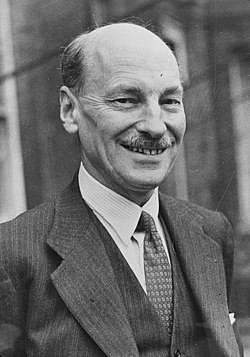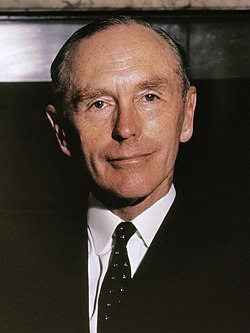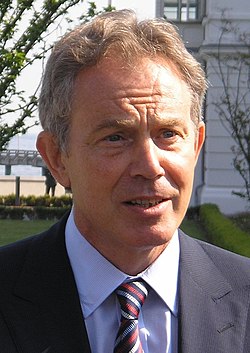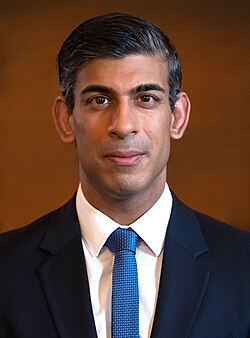Essay:RWRW's thoughts on UK Prime Ministers
Documented here are my opinions on the Prime Ministers of the United Kingdom. Idea stolen inspired by Duce’s, TheUmbilicalCordGuy’s, Oxyaena’s and Magic Master’s opinions on US Presidents.
| Contents |
|---|
|
|
Neville Chamberlain (1937–1940)[edit]
The good
The bad
Conclusions
Clement Attlee (1945–1951)[edit]
(Labour)
The good
- Put aside party politics to serve as Deputy Prime Minister in Churchill's war cabinet.
- Established the NHS (easily his best achievement).
- Was involved in the creation of the United Nations and NATO.
- Presided over Indian independence.
- Led the post-war rebuild of Britain.
The bad
- His participation in the Korean War
Conclusions
Attlee is rightly remembered as one of the best Prime Minister's the country has had. I imagine it was a torturous choice for voters in 1945 and 1951, where they had to choose between Clement Attlee and Winston Churchill.
Winston Churchill (1940–1945 and 1951–1955)[edit]
(Conservative)
The good
- Inspirational speeches that kept up morale during darkest times of World War Two.
- Did not seek/accept peace terms with Nazi Germany.
- Helped establish the 'Grand Alliance' with the US and Soviet Russia following Operation Barbarossa (Churchill tried to warn Stalin of a likely German invasion, but Stalin didn't believe him).
- In his second term he continued many successes of Attlee's government, including high employment and high health-care spending (despite Labour's claims he would do the opposite).
- Continued Attlee's polices of independence for African colonies.
- Allowed the establishment of ITV, ending the BBC's monopoly over television news.
The bad
- Remained in office far too long (retiring at the age of 80). He suffered strokes in his second term and spent a good portion of time leading the country from his bed.
- Enthusiastically supported and encouraged Britain's involvement in the First World War. Also a less-than-stellar record as First Lord of the Admiralty (Gallipoli in particular)
- His views on race, which even at the time was considered outdated.
- Presided over the 1943 Indian famine, which killed at least 3 million people.
Conclusions
He is rightly remembered as one of Britain's greatest Prime Ministers. But whilst his leadership during World War Two was exemplary, it is also important for us to remember his many errors, some of which were frankly awful.
Anthony Eden (1955–1957)[edit]
(Conservative)
The good
- Presided over a booming economy, high employment and high standards of living (though it was mainly just a continuation of what happened under Churchill and Attlee).
The bad
- His handling of the Suez Crisis, which damaged the UK's relationship with the United States and tarnished the UK's image around the world.
Conclusions
Eden was a distinguished Foreign Secretary during the second world war. But ultimately he was not a good Prime Minister.
Harold Macmillan (1957–1963)[edit]
(Conservative)
The good
- Rebuilt morale in his party (and the country) following the Suez Crisis.
- Rebuilt relations with the United States, that was also damaged by the Suez Crisis. Macmillan was apparently good friends with President Kennedy.
- Supported decolonisation of Africa (see his "Winds of Change" speech).
- Introduced premium bonds prior to becoming PM (something I use to this day).
- In foreign policy, Macmillan sought to ease Cold War tensions. He was able to assist in brokering the 1963 Nuclear Test-Ban Treaty between the United States, Soviet Union and Britain.
The bad
- Macmillan presided over many scandals within his government, including the Profumo scandal and the Vassall scandal. And whilst Macmillan was not involved in these scandals, it reflected badly as it involved people Macmillan had appointed to office and trusted.
Conclusions
‘Super-Mac’ was a good PM. Upon his appointment as Prime Minister, Macmillan told The Queen that he only expected his government to survive 6 weeks. He ended up lasting for 6 years, winning a decisive general election victory in 1959.
Alec Douglas-Home (1963–1964)[edit]
(Conservative)
The good
- He contested the 1964 general election and only lost by about 5 seats (despite losing he did far better than expected).
The bad
Conclusions
His short time in office means he did very little, and there isn't much to say about him. I will say that the incident where he talked his way out of getting kidnapped and gave his would-be captors beer (which I first heard about on RationalWiki) is hilarious.
Edward Heath (1970–1974)[edit]
The good
The bad
Conclusions
Harold Wilson (1964–1970 and 1974–1976)[edit]
(Labour)
The good
- Abolished capital punishment.
- Wilson's government oversaw many improvements in civil liberties, including decriminalising homosexuality and making divorces easier to do.
- Kept UK troops out of the Vietnam War. It angered President Johnson and damaged UK-US relations, but was the right thing to do.
- Educational reforms, including the establishment of the Open University (which Wilson apparently called his best achievement).
The bad
- Poor economic management, resulting in the devaluation of the pound by 14% in 1967.
The weird
Wilson's time in office has been the subject of many conspiracy theories.
- The best-known Wilson conspiracy theory was the belief that he was a secret KGB Agent. It comes from the fact that Wilson's predecessor as Labour Leader (Hugh Gaitskell) died very unexpectedly, and the fact that Wilson visited the Eastern bloc multiple times before becoming party leader. MI5 investigated and found no evidence that Wilson was working for Moscow, and it is known that Gaitskell's death, whilst sudden and unexpected, was from natural causes.
- Another conspiracy suggest that Wilson secretly thwarted a coup attempted being hatched by Lord Mountbatten and other establishment figures.
- His surprise resignation in 1976 sparked many conspiracies. Some suggest he did so in the face of another coup, that he'd been secretly diagnosed with Alzheimer's, or that he was trying to protect the Royal Family by diverting news attention away from Princess Margret's marriage break-up.
Conclusions
I'm fond of Wilson, actually. Labour politicians of today have nothing on Wilson. He kept the UK out of an American war, something future Labour PM Tony Blair would fail miserably at doing.
James Callaghan (1976–1979)[edit]
The good
The bad
Conclusions
Margret Thatcher (1979–1990)[edit]
The good
The bad
Conclusions
John Major (1990–1997)[edit]
The good
The bad
Conclusions
Tony Blair (1997–2007)[edit]
(Labour)
The good
- Good Friday agreement. Probably one of Blair’s finest moments as PM.
- Showed great leadership in the aftermath of Princess Dianna’s death. Blair again showed great leadership after 9/11.
- Repealed Section 28 and legalised civil partnerships.
- Introduced minimum wage.
- Devolved powers away from Westminster. In Wales he set up the Welsh Assembly, and in Scotland he set up the Scottish Parliament (with each country having their own First Minister). In London he set up the London Assembly and the position of Mayor of London.
- Was an interesting and charismatic leader. It’s not difficult to understand why he won a landslide over the bland and dull John Major.
The bad
- Iraq war. Obvious to most people that the Iraq War destabilised the region and made the world a more dangerous place. Also, the issue of whether Blair misled Parliament with the claims Iraq had weapons of mass destruction.
- Wanted to join Eurozone. Supposedly Blair only backed away from the issue when his Chancellor, Gordon Brown, opposed it and threatened to resign. [1]
- Stuffed the House of Lords with his cronies and people who had donated money to the Labour Party, in what became known as the ‘2007 Cash for Honours Scandal’.
- Constant lies and Alistair Campbell-spin cheapened politics.
- Notorious for seeing himself as more of a 'President' than a Prime Minister.
Conclusions
Had the potential to be remembered as one of the great Prime Ministers of the UK. Instead he is remembered for the Iraq War and the obscene amount of money he made since leaving office.
Gordon Brown (2007–2010)[edit]
(Labour)
The good
- Happened after he left office, but Brown deserves a lot of credit for his role in campaigning against Scottish Independence in 2014.
- Actually handled financial crisis better than people give him credit for.
- Resisted calls to join the Euro.
- Whilst initially in favour, Brown later became critical of the Iraq War and gave the go-ahead for inquiries.
The bad
- Rise to power was facilitated by Damian McBride’s slimy and underhanded sabotaging of potential leadership rivals. [2] Seems very unlikely that Brown was unaware.
- Sold tonnes of the UK’s gold reserves when the price of gold was extremely low, in “one of the worst investment decisions of all time.” [3] Happened whilst Brown was Chancellor, but it’s a big enough blunder that it deserves a mention here.
- Caught on mic calling one of his own voters “a bigoted woman” as she was concerned about high levels of immigration.
- Bottled out of holding an early election to get his own mandate. Whatever his reasons, it was seen as cowardice and his popularity never recovered.
Conclusions
Not a great Prime Minister, despite saving the world.
David Cameron (2010–2016)[edit]
(Conservative)
The good
- Economic management. Anyone from the UK will have gotten fed up with hearing Cameron banging on about his “long term economic plan”, but the fact is he took over a very uncertain time. Under Cameron the UK saw the GDP grow and unemployment fall. Credit should also be given to the Liberal Democrats for their role in helping the economy.
- Various tax cuts, including cutting corporation tax from 28% in 2010 to 20% by 2015 (which saw an increase in the amount of tax collected by The Treasury[4]), and taking millions of the lowest earners out of paying income tax.
- Legalised same sex marriage.
- Passed the Fixed Term Parliament Act. Ironically 2015 was the only election that actually followed the legislation, but in my opinion a fixed 5-year parliament is a good thing.
- Devolved powers to local governments. This resulted in the establishment of several new directly-elected Mayors, in places such as Greater Manchester, Liverpool City Region, and the West of England.
The bad
- Used taxpayer money for his own benefit, by sending a government-produced pro-EU leaflet to every house in the country.
- Joined Obama and Sarkozy in intervening in Libya, which perhaps unsurprisingly hasn’t gone so well. Cameron also wanted to intervene against Assad in Syria, but thankfully was defeated in the House of Commons.
- The Cameron economy wasn't a complete success. Homelessness and food bank use grew, and the national debt problem was not solved.
Conclusions
Not a bad Prime Minister. Not a great one, but not a bad one. His ultimate downfall was arrogance.
Theresa May (2016–2019)[edit]
(Conservative)
The good
- Took a strong stance against Russia after the poisoning of former Russian spy Sergei Skripal and his daughter, Yulia in Salisbury.[5][6] May’s response looked even more impressive when compared to the utterly pathetic response given by Labour’s Jeremy Corbyn[7]
- Continued some of the economic successes that had taken place under Cameron. This was in the face of remainers saying there would be an instant crash after the referendum result was announced, and after Article 50 was triggered.
- Laid the foundations for the UK's exit from the European Union.
- Best dance moves of any PM. [8][9]
The bad
- The 2017 election. So much can be said about May and the 2017 election. She called the election because she was 20% ahead in the polls (after months of saying she didn’t want an early election), she then proved to be a hopeless and wooden campaigner, she made U-turns and, in my opinion the worst thing of all, she refused to turn up to any TV debate. Her actions almost risked Brexit being cancelled, and almost resulted in Corbyn becoming PM and being propped up by the SNP. [10]
Conclusions
I actually have a great deal of sympathy for May. A weaker-willed person would have thrown in the towel after the 2017 election fiasco. But May followed her sense of duty and plodded along for 2 more years in the face of widescale abuse and mockery.
Boris Johnson (2019–2022)[edit]
(Conservative)
The good
- Succeeded where May failed in passing the Withdrawal Agreement and took the UK out of the European Union on 31 January 2020.
- The 2019 election – his large victory ended 2 years of chaos and deadlock, allowed for easy passage of his "oven-ready" Brexit Withdrawal Agreement, and brought about an end to Corbynism (there was a time when I genuinely thought Corbyn was on the verge of becoming PM).
- The UK's Covid-19 vaccination rollout, which is one of the best in the world.[11] Johnson took the UK out of the European Medicines Agency and ruled out joining the EU’s vaccination program, prompting considerable criticism from those on the left. Turned out to be an excellent decision as the UK quickly negotiated contracts with BioNTech and AstraZeneca which enabled a speedy rollout of the vaccine in the UK whilst the EU floundered. [12][13] He also put his faith in the Oxford-AstraZeneca vaccine whilst Merkel and Macron continued to spread fake news/anti-vax rhetoric about the vaccine being ineffective and unsafe. Unsurprisingly, the jab turned out to be both safe and effective. [14] [15][16]
- I found that the Covid-19 decisions that Johnson made in 2021 were all appropriate. As mentioned above, the initial vaccine rollout was exceptional. The booster rollout in the Autumn/Winter of 2021 was just as good[17], with Johnson leading the charge [18]. Johnson also opened the country back up on 19 July, which was criticised by many at the time, but I think he was ultimately proven right. He also took a more measured approach to the Omicron strain, instituting mask mandates and Covid passes but resisted National lockdowns (unlike the devolved administrations of Scotland, Wales, and Norther Ireland), which again seems to have been the right decision.
- He handled the UK’s response to the Russian invasion of Ukraine well. The UK has supplied the Ukrainian army with weapons, imposed strict sanctions on Russia and Russian oligarchs and opened the door to Ukrainian refugees. Johnson also pushed for European nations to end their dependence on Russian oil, thus weakening Putin’s influence over Europe.[19] His actions earned praise from President Zelenskyy, who said he was “doing more” than most other leaders [20], whilst the Kremlin described Johnson as being “the most active anti-Russian leader” [21]
- In the 2019 election, Johnson promised to recruit 50,000 new nurses and 20,000 new police officers. He was on the way to achieving these targets, with 23,000 new nurses and 13,000 new police officers being recruited by Summer 2022. He also left office with unemployment at 3.8%, the lowest for decades.
The bad
- Implementation of lockdowns and restrictions in 2020, which are widely regarded as having been done too late. Also, lots of problems with Test and Trace and short supply of PPE at the start of the pandemic.
- His inability to dismiss cabinet ministers and other officials when they run amok. He refused to sack his Chief Advisor Dominic Cummings after the Barnard Castle debacle. He also refused to sack Health Secretary Matt Hancock after he was caught having an affair (whilst instructing the public to avoid contact with non-household members), and for over a year he refused to sack Education Secretary Gavin Williamson, who was shockingly bad at his job.
- The scandals. Partygate (for which he received a fine, a first ever for a sitting PM[22]), attempting to change parliamentary rules to protect the crook Owen Paterson, and the lies surrounding the appointment of the appropriately-named groper Chris Pincher. Each of these scandals have been hugely damaging and ultimately brought Johnson down.
Conclusions
I’m disappointed with how it ended. I’ve always liked Johnson, and for years I thought his ascension to Prime Minister was inevitable. After he won a landslide in 2019, I thought he’d go on to match Blair’s and Thatcher’s decade-long reigns. I am immensely grateful to Johnson for his role in taking the UK out of the EU, essentially leading the West’s response to the Russian invasion of Ukraine and his role in making the UK’s vaccination deployment on of the best in the world.
But the constant scandals and the lies became too much for the country to take, and we need a break from it for a while.
No PM has served non-consecutive terms since the 1970’s, but if anyone is going to break the trend it will be Johnson.
Liz Truss (2022)[edit]
(Conservative)
The good
- Continued Boris Johnson’s support for Ukraine. She previously supported Ukraine in her capacity as Foreign Secretary in Johnson’s government.
- She froze the spiralling energy bills in her first week as PM.
The bad
- Truss and Chancellor Kwasi Kwarteng’s mini budget of September 2022, which was a disaster. Whilst I’m all for tax cuts, the ones proposed are completely unfunded, with the government planning on paying for it by increasing borrowing (a pretty un-conservative thing to do). The tax cuts directed at higher earners is quite hard to justify during a cost-of-living crisis, and resulted in an embarrassing U-turn by the government. [23] The pound collapsed to record lows right after the budget. [24] It also resulted in Labour taking a massive lead in the polls. [25] [26]
Conclusions
As a bit of a political junkie, I’ve been aware of Truss for years, and I never once saw her as a potential PM. Watching her speak and debate during the leadership election did little to convince me otherwise.
Honestly, I expected Truss to fail from the moment she became PM. But I was stunned by the speed of her downfall. She holds the ‘title’ of being the UK’s shortest serving PM ever, and that’s not something she should be proud of.
Rishi Sunak (2022-2024)[edit]
(Conservative)
The good
- He was the architect of the Covid furlough scheme as Chancellor.
- He was clearly on the right side of the argument with his opposition to Truss' economics.
- Stabilised the economy following Truss’ kamikaze premiership.
The bad
- He is susceptible to scandal. He was implicated in Partygate - and although looking at the circumstances I personally believe his fine was unjust and he should have appealed it, it could be held against him. Also, the issues surrounding his family's tax contributions.
Conclusions
Evidently the Conservative Party membership made a big mistake when they elected Truss over Sunak.
Sunak ultimately failed at an impossible task. Whilst Sunak’s 2024 general election campaign was poor, Truss had done so much damage to the Conservative Party that I’m not sure anyone could have turned it around.
Keir Starmer (2024-present)[edit]
(Labour)
The good
The bad
Conclusions
References[edit]
- ↑ https://www.bbc.co.uk/news/uk-politics-11947831
- ↑ https://www.bbc.co.uk/news/uk-24171077
- ↑ https://www.bbc.co.uk/news/business-48177767
- ↑ https://www.statista.com/statistics/284319/united-kingdom-hmrc-tax-receipts-corporation-tax/
- ↑ https://www.theguardian.com/uk-news/2018/mar/12/russia-highly-likely-to-be-behind-poisoning-of-spy-says-theresa-may
- ↑ https://www.euronews.com/2019/06/28/theresa-may-confronts-vladimir-putin-over-poisoning-of-former-russian-spy-in-uk
- ↑ https://www.theguardian.com/uk-news/2018/mar/14/jeremy-corbyn-under-fire-over-response-to-pms-russia-statement
- ↑ https://www.youtube.com/watch?v=tbCDFNRA-Wo
- ↑ https://www.youtube.com/watch?v=gGtOT1tIAwg
- ↑ https://www.independent.co.uk/news/uk/politics/corbyn-election-results-votes-away-prime-minister-theresa-may-hung-parliament-a7782581.html
- ↑ https://ourworldindata.org/covid-vaccinations
- ↑ https://www.bbc.co.uk/news/explainers-56286235
- ↑ https://www.repubblica.it/cronaca/2021/01/26/news/interview_pascal_soriot_ceo_astrazeneca_coronavirus_covid_vaccines-284349628/
- ↑ https://www.bbc.co.uk/news/health-55910964
- ↑ https://www.theguardian.com/world/2021/mar/18/astrazeneca-covid-vaccine-safe-ema-blood-clotting
- ↑ https://www.bbc.co.uk/news/health-56479462
- ↑ https://ourworldindata.org/grapher/covid-vaccine-booster-doses-per-capita?country=BGD~BRA~CHL~DNK~IND~RUS~GBR~USA~OWID_WRL
- ↑ https://www.bbc.co.uk/news/uk-59631570
- ↑ https://news.sky.com/story/ukraine-war-boris-johnson-calls-on-western-nations-to-take-back-control-of-energy-supplies-to-end-addiction-to-russian-oil-and-gas-12566471
- ↑ https://www.thetimes.co.uk/article/ukraine-is-looking-for-peace-without-delay-says-zelensky-0tw5p3xmw
- ↑ https://www.independent.co.uk/news/uk/politics/boris-johnson-kremlin-attack-russia-ukraine-b2043073.html
- ↑ https://www.bbc.co.uk/news/uk-politics-61083402
- ↑ https://www.bbc.co.uk/news/uk-63114279
- ↑ https://www.bbc.co.uk/news/business-63030208
- ↑ https://docs.cdn.yougov.com/6ukuklig5f/TheTimes_VI_BestPM_220929_W.pdf
- ↑ https://redfieldandwiltonstrategies.com/latest-gb-voting-intention-2-october-2022/














